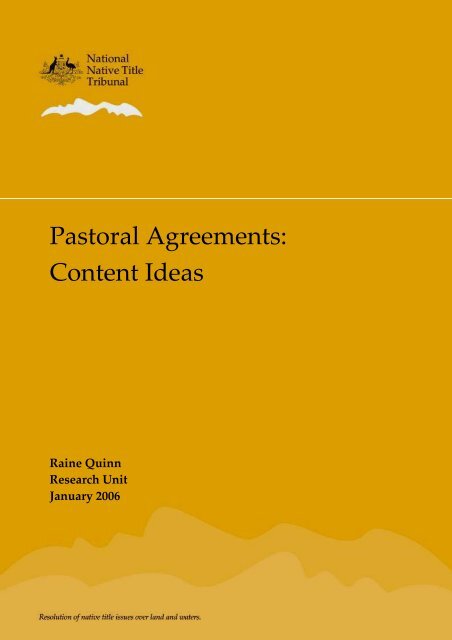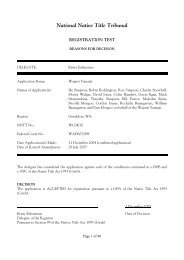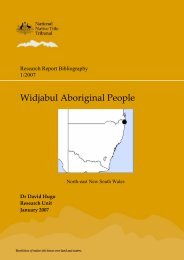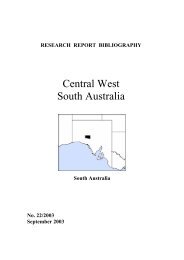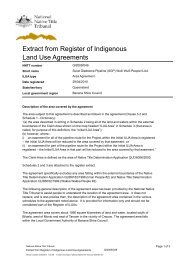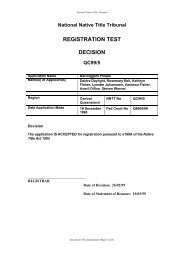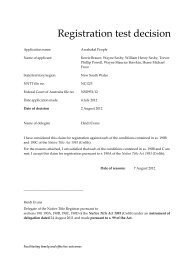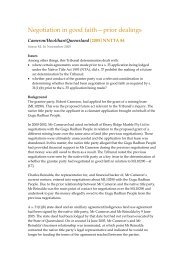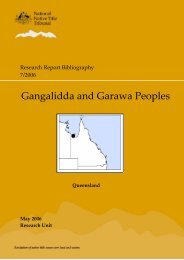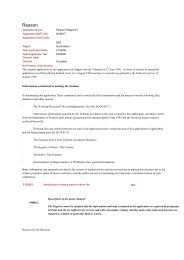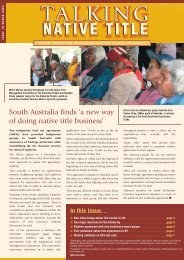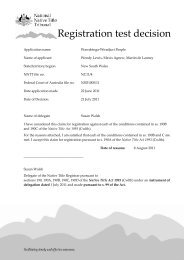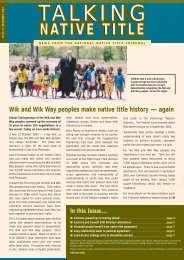Pastoral Agreements: Content Ideas - National Native Title Tribunal
Pastoral Agreements: Content Ideas - National Native Title Tribunal
Pastoral Agreements: Content Ideas - National Native Title Tribunal
Create successful ePaper yourself
Turn your PDF publications into a flip-book with our unique Google optimized e-Paper software.
<strong>Pastoral</strong> <strong>Agreements</strong>:<br />
<strong>Content</strong> <strong>Ideas</strong><br />
Raine Quinn<br />
Research Unit<br />
January 2006
<strong>National</strong> <strong>Native</strong> <strong>Title</strong> <strong>Tribunal</strong> - <strong>Pastoral</strong> <strong>Agreements</strong><br />
Disclaimer<br />
This document is provided by the <strong>National</strong> <strong>Native</strong> <strong>Title</strong> <strong>Tribunal</strong> as general information<br />
only. It is made available on the understanding that neither the <strong>National</strong> <strong>Native</strong> <strong>Title</strong><br />
<strong>Tribunal</strong> and its staff and officers nor the Commonwealth are rendering professional<br />
advice. In particular, they:<br />
Accept no responsibility for the results of any actions taken on the basis of information<br />
contained in this paper, nor for the accuracy or completeness of any material it contains;<br />
and<br />
To the extent allowed by law, expressly disclaim all and any liability and responsibility to<br />
any person in respect of the consequences of anything done or omitted to be done by that<br />
person in reliance, either wholly or partially, upon the information contained herein.<br />
It is strongly recommended that all readers exercise their own skill and care with respect<br />
to the use of the information contained in this document. Readers are requested to<br />
carefully consider its accuracy, currency, completeness and relevance to their purposes,<br />
and should obtain professional advice appropriate to their particular circumstances. This<br />
information does not indicate any commitment to any particular course of action by either<br />
the <strong>Tribunal</strong> or the Commonwealth.<br />
© Commonwealth of Australia 2006<br />
This work is copyright. It may be reproduced in whole or in part for study or training<br />
purposes if an acknowledgment of the source is included. Such use must not be for the<br />
purposes of sale or commercial exploitation.<br />
Subject to the Copyright Act, reproduction, storage in a retrieval system or transmission<br />
in any form by any means of any part of the work other than for the purposes above is not<br />
permitted without written permission.<br />
Information about this report and requests and inquiries concerning reproduction should<br />
be addressed to Manager, Research Unit, <strong>National</strong> <strong>Native</strong> <strong>Title</strong> <strong>Tribunal</strong>, GPO Box 9973,<br />
Perth WA 6484.<br />
Telephone: (08) 9268 7272<br />
Facsimile: (08) 9268 7299<br />
E-mail: reports@nntt.gov.au<br />
Web site: www.nntt.gov.au<br />
2
<strong>National</strong> <strong>Native</strong> <strong>Title</strong> <strong>Tribunal</strong> - <strong>Pastoral</strong> <strong>Agreements</strong><br />
<strong>Content</strong>s<br />
<strong>Pastoral</strong> agreements.......................................................................................................... 5<br />
Introduction................................................................................................................... 5<br />
Part 1: Key Themes ...................................................................................................... 6<br />
Part 2: Issues for Consideration .................................................................................. 9<br />
Indigenous Land Use <strong>Agreements</strong>.............................................................................. 9<br />
Process or Framework <strong>Agreements</strong> .......................................................................... 10<br />
Memorandum of Understanding or Accord.............................................................. 10<br />
2.1 Issues to consider in developing an Indigenous Land Use Agreement (ILUA) . 11<br />
Parties.................................................................................................................... 11<br />
Recitals/Background/Preamble/Objectives........................................................... 11<br />
Definitions and interpretation ............................................................................... 12<br />
Description of Area............................................................................................... 12<br />
Tenure ................................................................................................................... 12<br />
Warranties/Authority ............................................................................................ 12<br />
Access ................................................................................................................... 12<br />
Alcohol.................................................................................................................. 14<br />
Firearms ................................................................................................................ 14<br />
State assistance to the parties................................................................................ 14<br />
Privacy .................................................................................................................. 14<br />
Things to observe while on the pastoral lease ...................................................... 14<br />
<strong>Native</strong> title party ................................................................................................... 15<br />
<strong>Pastoral</strong>ist.............................................................................................................. 15<br />
Aboriginal heritage and other laws....................................................................... 16<br />
Visitors and campers............................................................................................. 16<br />
Meetings and communication............................................................................... 17<br />
Employment and training...................................................................................... 17<br />
Future Acts............................................................................................................ 17<br />
Dispute resolution ................................................................................................. 17<br />
Breach of agreement ............................................................................................. 18<br />
Governing/applicable law ..................................................................................... 18<br />
Commencement/expiry......................................................................................... 18<br />
Review of agreement ............................................................................................ 18<br />
Registration of the ILUA ...................................................................................... 18<br />
<strong>Native</strong> <strong>Title</strong> Determination ................................................................................... 19<br />
Insurance/liability/indemnity ................................................................................ 19<br />
Assignment and encumbrances............................................................................. 19<br />
Confidentiality ...................................................................................................... 20<br />
Notice.................................................................................................................... 20<br />
Waiver................................................................................................................... 20<br />
Costs...................................................................................................................... 20<br />
Entire agreement and variation ............................................................................. 20<br />
Counterparts.......................................................................................................... 20<br />
Execution of agreement ........................................................................................ 20<br />
Schedules .............................................................................................................. 20<br />
3
<strong>National</strong> <strong>Native</strong> <strong>Title</strong> <strong>Tribunal</strong> - <strong>Pastoral</strong> <strong>Agreements</strong><br />
2.2 Issues to consider in developing a <strong>Pastoral</strong> Access Protocol.............................. 22<br />
Parties.................................................................................................................... 22<br />
Recitals/Background/Preamble/Objectives........................................................... 22<br />
Definitions and interpretation ............................................................................... 22<br />
Warranties/Authority ............................................................................................ 22<br />
Description of Area............................................................................................... 22<br />
Rights of the native title party............................................................................... 22<br />
Access ................................................................................................................... 23<br />
<strong>Native</strong> title party ................................................................................................... 23<br />
<strong>Pastoral</strong>ist.............................................................................................................. 24<br />
Insurance/liability/indemnity ................................................................................ 24<br />
Excluded areas ...................................................................................................... 24<br />
Notice.................................................................................................................... 24<br />
Renewal of the pastoral lease................................................................................ 24<br />
Aboriginal heritage and other laws....................................................................... 25<br />
Employment, training and contractual opportunities............................................ 25<br />
Dispute Resolution................................................................................................ 25<br />
Assignment and encumbrances............................................................................. 25<br />
Memorial on the Certificate of Crown Land......................................................... 26<br />
Execution of agreement ........................................................................................ 26<br />
Schedules .............................................................................................................. 26<br />
2.3 Issues to consider in developing a Memorandum of Understanding (MoU)...... 27<br />
Parties.................................................................................................................... 27<br />
Recitals/Background/Preamble/Objectives........................................................... 27<br />
Relationship between the parties .......................................................................... 27<br />
Description of Area............................................................................................... 27<br />
Access ................................................................................................................... 27<br />
Camping................................................................................................................ 28<br />
Fires....................................................................................................................... 28<br />
Rubbish ................................................................................................................. 28<br />
Gates and Fences................................................................................................... 28<br />
Firearms ................................................................................................................ 29<br />
Use of flora and fauna........................................................................................... 29<br />
Dogs ...................................................................................................................... 29<br />
Alcohol.................................................................................................................. 29<br />
Infrastructure......................................................................................................... 29<br />
Environmental and cultural heritage..................................................................... 29<br />
Ongoing Discussion.............................................................................................. 30<br />
Dispute Resolution................................................................................................ 30<br />
2.4 Issues not included in these agreements but which might be useful to consider 31<br />
Succession............................................................................................................. 31<br />
Independent Legal advice ..................................................................................... 31<br />
Costs...................................................................................................................... 31<br />
4
<strong>National</strong> <strong>Native</strong> <strong>Title</strong> <strong>Tribunal</strong> - <strong>Pastoral</strong> <strong>Agreements</strong><br />
Part 1. Key Themes<br />
<strong>Pastoral</strong> agreements<br />
Introduction<br />
This guide gives an overview of content ideas for agreements between pastoralists and<br />
native title parties. It provides a series of triggers to help parties canvass important issues<br />
during negotiations. It does not aim to be an exhaustive source of information on pastoral<br />
agreements or what they should include.<br />
Part 1 sets out key themes that have been identified for agreement makers to consider to<br />
ensure agreements are durable or sustainable 1 .<br />
Part 2 lists by topic issues for consideration in the drafting and negotiation of the<br />
agreements. This list is not meant to be exhaustive. Many of the topics will not be<br />
relevant to some agreements, for example they may not apply to a small-scale or single<br />
purpose agreement. However, the topics, although not universally applicable, may be<br />
worth consideration. If they are not applicable, they may be ignored.<br />
Before entering agreement negotiations parties need to be sure about what they want to<br />
achieve. Will so many issues be tied down that meeting the terms of the agreement<br />
becomes onerous or the agreement becomes unworkable Or will things be left up in the<br />
air with no mechanism for resolution Will the native title party be any better off under<br />
the agreement, or would they be better off by simply entering under a pastoral<br />
reservation Parties may wish to consider encouraging the relevant State government to<br />
change the legislation to achieve some of the issues that are often covered in pastoral<br />
agreements. For example included in the recent amendment to the <strong>Pastoral</strong> Land<br />
Management and Conservation Act 1989 (SA) 2 are matters such as land use agreements<br />
binding lessees (assignment), liability, rights of Aboriginal persons, preferential access<br />
for ILUA parties including the right to travel across and camp on pastoral land, a public<br />
register, trespassers, and public access.<br />
The <strong>National</strong> <strong>Native</strong> <strong>Title</strong> <strong>Tribunal</strong> (the <strong>Tribunal</strong>) has a wide range of detailed<br />
information about agreement-making. This guide will be most useful if read in<br />
conjunction with other <strong>Tribunal</strong> publications about the types of agreement parties<br />
consider making.<br />
The <strong>Tribunal</strong> can also provide assistance to parties at all stages of the agreement-making<br />
process. Members, case managers and specialist employees have extensive knowledge<br />
and experience in different types of agreements. Contact the <strong>Tribunal</strong> on Freecall 1800<br />
640 501 for more information or to request assistance.<br />
1 According to Allbrook and Jebb, 'In relation to sustainability of agreements, research to date has tended to<br />
define sustainability in this context as meaning an agreement that brings about lasting positive change in<br />
the broad socio-economic status of Indigenous communities', Malcolm Allbrook and Dr Mary Anne Jebb<br />
2004, Implementation and Resourcing of <strong>Native</strong> <strong>Title</strong> and Related <strong>Agreements</strong>, NNTT, Perth, page 2.<br />
Other parties may view sustainability differently.<br />
2 <strong>Pastoral</strong> Land Management and Conservation Act 1989 (SA) Division 2A and 3.<br />
5
<strong>National</strong> <strong>Native</strong> <strong>Title</strong> <strong>Tribunal</strong> - <strong>Pastoral</strong> <strong>Agreements</strong><br />
Part 1. Key Themes<br />
Part 1: Key Themes<br />
Themes to consider are:<br />
• parties need to be committed to the agreement;<br />
• if developing an on-going relationship between the parties then a communication<br />
strategy needs to be set, including:<br />
o face to face meetings;<br />
o out of session communication (e-mail, telephone, written etc);<br />
o respect and goodwill; and<br />
o mutual acknowledgement of rights;<br />
• the terms, legal procedures and timeframes need to be understood by the parties<br />
throughout the agreement;<br />
• the parties need to be kept informed of achievements, milestones and the<br />
alternatives 3 ;<br />
• a means to ensure to the greatest extent possible that 'outcomes promised in<br />
agreements actually materialise' 4 ;<br />
• preferably achievement focussed;<br />
• an implementation plan/schedule needs to be set which specifies who is<br />
responsible for what actions and when;<br />
o<br />
the plan may also include provisions for resourcing the implementation of the<br />
agreement – immediate support post agreement and longer term support to<br />
build stability; and<br />
• specific provisions for monitoring, review 5 (periodic and regular), management<br />
and liaison may be agreed to if appropriate for the agreement.<br />
According to Allbrook and Jebb, agreements will be more durable if they take into<br />
account issues that affect the Indigenous parties to an agreement, for example<br />
'community' 6 , communications, governance, succession and capacity' (2004, page11).<br />
Further,<br />
<strong>Agreements</strong> need to take account of the 'structural limitations' of Indigenous<br />
communities, including their socio-economic status, education, welfare and health.<br />
These can introduce capacity issues, which may result in major limitations as far as<br />
agreement outcomes are concerned. The capacity of a population to exercise the<br />
benefits envisaged in an agreement, … will inevitably have an impact on the eventual<br />
effectiveness of an agreement …It is critical that the diversity and complexity of the<br />
community of Indigenous parties is understood, acknowledged and helps to inform<br />
3 Allbrook and Jebb 2004, page 26.<br />
4 R. Kelly and C. O'Fairchellaigh 2002, '<strong>Native</strong> title, mining and agreement making: best practice in<br />
commercial negotiations' in <strong>Native</strong> <strong>Title</strong> and Cultural Heritage in 2002, Novotel Hotel, Brisbane, page 9.<br />
5 ATSIC 2001, Regional <strong>Agreements</strong> Manual, p. 23 cited in Malcolm Allbrook and Dr Mary Anne Jebb<br />
2004, Implementation and Resourcing of <strong>Native</strong> <strong>Title</strong> and Related <strong>Agreements</strong>, NNTT, Perth, page 9.<br />
6 Issues noted by Allbrook and Jebb relating to 'community' included 'larger numbers of people,<br />
representation, individual vs. community benefit' (2004, page 11). S. Holcombe included equality vs<br />
hierarchy as an issue. S. Holcombe 2004, 'Early Indigenous engagement with mining in the Pilbara:<br />
Lessons from a historical perspective', CAEPR Working Paper No. 24/2004, Centre for Aboriginal<br />
Economic Policy Research, ANU, Canberra, page 11.<br />
6
<strong>National</strong> <strong>Native</strong> <strong>Title</strong> <strong>Tribunal</strong> - <strong>Pastoral</strong> <strong>Agreements</strong><br />
Part 1. Key Themes<br />
negotiations. <strong>Agreements</strong> that seek to 'mark out' selected individuals and provide<br />
benefits to them to the exclusion of others risk collapse. … Thus negotiators need to<br />
'factor in' this diversity and consider 'hybrid' arrangements that reflect the dynamism,<br />
complexity and diversity of Indigenous communities. … However, while a multifaceted<br />
agreement may result in a robust agreement, this may also be too complex and too<br />
expensive for companies. There has to be [a] careful look at the human resources<br />
needed to sustain monitoring and liaison structures. Does the structure 'fit' with the<br />
system on the ground – is it realistic (2004, page 12)<br />
Recently Allbrook also noted that sustainable agreements are based on sustainable<br />
relationships between the parties and this relationship and the intentions of the parties<br />
may be reflected in the implementation provisions 7 .<br />
Other factors impacting on the sustainability of agreements include:<br />
• the involvement of the relevant Indigenous organisations in the agreement;<br />
• 'an effective interface between the broad community and the party';<br />
• an 'agreement in principle', setting out the parameters and provisions of the<br />
expected agreement; and<br />
• attention to drafting. Citing Blowes and Trigger 8 , Allbrook and Jebb noted that 'a<br />
well-drafted document can potentially mean the difference between a long-term<br />
workable relationship between the parties and an incessant struggle over just what<br />
really was agreed' (2004, pages 13 and 17).<br />
This emphasises the importance of an agreement that is practically sustainable, taking<br />
into account the capacity of the parties to meet their obligations and exercise their rights<br />
under the agreement for its duration.<br />
Other practical considerations include:<br />
• the potential impact of the agreement on Centrelink and other payments;<br />
• the taxation implications for individuals including 'the taxation status of<br />
Aboriginal lands' (2004, page 26) and rateability;<br />
• how financial and other benefits may be distributed – may be in a different<br />
instrument; and<br />
• employment and training targets and business development assistance.<br />
Dispute resolution procedures are included in most agreements. Allbrook and Jebb point<br />
out that dispute resolution procedures should be unambiguous and should set out<br />
7 Malcolm Allbrook and Mary Anne Jebb 2004 'Implementing and resourcing native title and related<br />
agreements' Seminar, NNTT, Perth.<br />
8 R. Blowes and D. Trigger 1999, 'Negotiating The Century Mine <strong>Agreements</strong>: Issues of Law, Culture and<br />
Politics', in Mary Edmunds (ed), Regional <strong>Agreements</strong> in Australia: Vol 2: Case Studies, AIATSIS,<br />
Canberra, page 101.<br />
7
<strong>National</strong> <strong>Native</strong> <strong>Title</strong> <strong>Tribunal</strong> - <strong>Pastoral</strong> <strong>Agreements</strong><br />
Part 1. Key Themes<br />
procedures that all parties understand and are happy with. The procedures should allow<br />
the parties to try to identify and resolve a disagreement internally before it becomes<br />
identified as a formal 'dispute' which would then proceed to external mediators or<br />
arbitrators for resolution' (2004, page 23).<br />
8
<strong>National</strong> <strong>Native</strong> <strong>Title</strong> <strong>Tribunal</strong> - <strong>Pastoral</strong> <strong>Agreements</strong><br />
Part 1. Key Themes<br />
Part 2: Issues for Consideration<br />
Each agreement will turn on its own facts and other important issues may also need to<br />
be included. No attempt has been made to provide precedent clauses, as <strong>Tribunal</strong><br />
Members' experience suggests that these are of limited value. Each agreement will<br />
have its own nuances and peculiar focus that makes the use of "off the shelf" clauses<br />
potentially problematic. However, the agreements negotiated to date seem to embody<br />
the concepts of reciprocity and mutuality to a greater or lesser extent.<br />
The headings used in this guide are common to a number of actual agreements. The<br />
elements are included in dot point form under each heading and form the triggers for<br />
further inquiry. In addition some headings and elements that were not found in the<br />
pastoral agreements sampled have been included. These are italicised for ease of<br />
identification.<br />
Within the text the parties are phrased in the singular but it is recognised that there<br />
could be more than one native title party or non-native title party to an agreement.<br />
Indigenous Land Use <strong>Agreements</strong><br />
An ILUA is a statutory agreement about the use and management of land that can be<br />
made between a native title party and other interested parties such as State<br />
governments. ILUAs allow people to negotiate flexible, pragmatic agreements to suit<br />
their particular circumstances. While ILUAs can be made separately from the formal<br />
native title process, they may also be stepping stones towards, or be part of, native<br />
title determinations. A decision whether to use an ILUA needs to be made on a case<br />
by case basis and readers should refer to other <strong>Tribunal</strong> guides to assist them in this<br />
decision (see http://www.nntt.gov.au/ilua/Info.html).<br />
ILUAs may be made about matters such as:<br />
• native title holders agreeing to a future developments;<br />
• the relationship between native title rights and the rights of other people;<br />
• access and/or management arrangements;<br />
• surrender of native title; and<br />
• compensation.<br />
Unlike other agreements, once it is registered on the Register for Indigenous Land<br />
Use <strong>Agreements</strong>, an ILUA binds all native title holders to the terms of the agreement<br />
even if they are not a party to the agreement.<br />
Only ILUAs that comply with the legal requirements can be registered. By contacting<br />
the <strong>Tribunal</strong> early in the negotiation process, you will receive the assistance and<br />
information you need to ensure that the ILUA you are negotiating meets the<br />
requirements for registration (see ‘Getting help from the <strong>Tribunal</strong>’ at<br />
http://www.nntt.gov.au/ilua/Info.html).<br />
The kind of help the <strong>Tribunal</strong> may give to parties includes:<br />
• negotiation assistance;<br />
• project management;<br />
• technical information and support relating to ILUAs;<br />
9
<strong>National</strong> <strong>Native</strong> <strong>Title</strong> <strong>Tribunal</strong> - <strong>Pastoral</strong> <strong>Agreements</strong><br />
Part 1. Key Themes<br />
• conducting preliminary consultations;<br />
• background research support helping non-indigenous parties to identify the<br />
correct native title groups;<br />
• helping non-indigenous parties to identify the correct native title groups;<br />
• reviewing and providing maps of the ILUA area;<br />
• providing options for negotiations;<br />
• providing land tenure information and conducting searches; and<br />
• checking draft agreements for compliance with legal requirements and<br />
providing feedback.<br />
Process or Framework <strong>Agreements</strong><br />
A Process or Framework Agreement is an agreement between a native title party and<br />
other interested parties. Such agreements generally bind parties to a particular<br />
process rather than substantive issues. For example, a framework or process<br />
agreement may set out the process agreed to between the parties for the negotiation of<br />
an ILUA.<br />
Memorandum of Understanding or Accord<br />
Memoranda of Understanding (MoU), or Accords, are non-legally binding documents<br />
which demonstrate political will. They can be used to create a framework for further<br />
action, clarifying the roles and responsibilities of the parties. MoUs can be based on<br />
community consultations and negotiations rather than on a legal framework and the<br />
involvement of lawyers. The aim is to reach an amicable and workable arrangement<br />
for the longer-term benefit of the community.<br />
10
<strong>National</strong> <strong>Native</strong> <strong>Title</strong> <strong>Tribunal</strong> - <strong>Pastoral</strong> <strong>Agreements</strong><br />
Part 1. Key Themes<br />
2.1 Issues to consider in developing an Indigenous Land Use<br />
Agreement (ILUA)<br />
A number of complex issues arise in relation to the drafting and registration of an<br />
ILUA.<br />
Parties may refer to the information provided on the <strong>National</strong> <strong>Native</strong> <strong>Title</strong> <strong>Tribunal</strong><br />
website at http://www.nntt.gov.au/ilua/. Information provided on the website<br />
includes:<br />
• information about ILUAs;<br />
• how to apply for registration of an ILUA;<br />
• information about how to request <strong>Tribunal</strong> assistance;<br />
• guidelines and application forms for registration of ILUAs; and<br />
• summary information about all registered ILUAs.<br />
The <strong>Tribunal</strong> can provide a wide range of assistance, including negotiation assistance<br />
and assessing ILUA applications before lodgement to check whether they meet the<br />
registration requirements. It might be relevant to check with the parties whether a<br />
pre-lodgement assessment might be useful.<br />
The following material is based on the analysis of two <strong>Pastoral</strong> ILUAs.<br />
Parties<br />
These are the people, companies, unincorporated associations and governments who<br />
enter the agreement. For an ILUA to meet the requirements for registration, it is<br />
essential that the right parties are involved for the type of ILUA you are negotiating.<br />
(See ‘Steps to an ILUA’ – step 4 Parties to ILUAs at<br />
http://www.nntt.gov.au/ilua/Info.html).<br />
Recitals/Background/Preamble/Objectives<br />
The recitals/background/preamble/objectives may or may not form part of the<br />
agreement. However, they set the scene, provide the background and give an<br />
overview of matters which will be subject to specific clauses in the agreement. This<br />
part may:<br />
• describe the existing state of affairs;<br />
• give the reasons for entering into the agreement;<br />
• provide an explanation of intention;<br />
• mention if Subdivision Q is relevant 9 ;<br />
• acknowledge the relationship and traditional connection the native title party<br />
has to the pastoral property;<br />
• acknowledge the lessee's rights;<br />
• acknowledge that the agreement does not operate to extinguish or create native<br />
title rights in relation to the land;<br />
• describe the effect of the agreement on the rights of the native title holders;<br />
9 Subdivision Q agreements are only applicable in limited circumstances and deal with conferral of<br />
access rights on certain native title claimants in respect of non-exclusive agricultural and pastoral<br />
leases. (<strong>Native</strong> <strong>Title</strong> Act 1993 (Cth) ss44A-44G)<br />
11
<strong>National</strong> <strong>Native</strong> <strong>Title</strong> <strong>Tribunal</strong> - <strong>Pastoral</strong> <strong>Agreements</strong><br />
Part 1. Key Themes<br />
• acknowledge the responsibility of the State;<br />
• acknowledge the history of colonisation on behalf of the State;<br />
• describe who the agreement is between;<br />
• describe the area covered by the agreement;<br />
• describe the activity allowed under the agreement;<br />
• describe the timeframe of the agreement; and<br />
• describe whether the agreement is legally binding.<br />
Definitions and interpretation<br />
Defines the terms used in the agreement including a description of the agreement area.<br />
Description of Area<br />
Describes the area covered by the agreement.<br />
Tenure<br />
May state:<br />
• the objective of the agreement for the pastoralist eg increased security of<br />
tenure through the grant of a perpetual lease over the pastoral property. The<br />
process may be described.<br />
• the objective of the agreement for the native title party eg in relation to<br />
specified parcels of land - recognition of native title rights and interests,<br />
perpetual lease for pastoralist and grant of freehold title for native title party.<br />
Implementation process may be described.<br />
Warranties/Authority<br />
May state that the native title party warrants and represents that:<br />
• it has obtained all necessary authorisations, consents and approvals necessary<br />
to enter the agreement so as the bind the native title party including<br />
authorisation as defined in section 251A of the <strong>Native</strong> <strong>Title</strong> Act, 1993 (Cth)<br />
(NTA);<br />
• they will comply with the agreement; and<br />
• they agree to be bound by the agreement.<br />
May state that the pastoralist warrants and represents that:<br />
• they will comply with the agreement; and<br />
• they agree to be bound by the agreement.<br />
Access<br />
Do you need to consider access arrangements for non-native title and/or native title<br />
parties An amendment to the South Australian <strong>Pastoral</strong> Land Management and<br />
Conservation Act 1989 allows for preferential access to ILUA parties. Other items for<br />
consideration may include:<br />
• a statement may be included about whose rights have precedence;<br />
• native title party may give permission to native title party invitees to carry out<br />
or be involved in traditional activities;<br />
• native title party responsible for the conduct of invitees and that they comply<br />
with any reasonable direction by pastoralist;<br />
12
<strong>National</strong> <strong>Native</strong> <strong>Title</strong> <strong>Tribunal</strong> - <strong>Pastoral</strong> <strong>Agreements</strong><br />
Part 1. Key Themes<br />
• native title party have rights to enter, travel across and stay on the pastoral<br />
lease 10 and while there carry out traditional activities;<br />
o how are these dealt with in the ILUA<br />
• can native title party invitees enter and while there carry out traditional<br />
activities<br />
• do other Indigenous people not parties to the agreement have access or other<br />
rights 11 <br />
• in carrying out traditional activities do the native title party and invitees agree<br />
to:<br />
o give notice to the pastoralist;<br />
• specified timeframe for notice;<br />
• the name of a contact person to liaise with the pastoralist and to be<br />
responsible for ensuring the agreement's guidelines are adhered to;<br />
• may include a list identifying Elders and Indigenous rangers;<br />
• the contact person/pastoralist to be informed of the area, general<br />
purpose of the visit, length of stay, camping locations, number of<br />
visitors, names of key contact people for the group; names of any<br />
licensed firearms holders who intend to hunt; approximate number of<br />
vehicles; name and relationship of any invitees, places to be visited;<br />
o follow any reasonable direction of the pastoralist about such things as:<br />
• where not to camp;<br />
• temporary restrictions to an area;<br />
• use of station roads and tracks;<br />
• lighting and extinguishment of fires;<br />
• control of dogs or other animals;<br />
• where not to hunt using firearms;<br />
• safety; and<br />
• environmental conservation.<br />
Where a direction would require a breach of Indigenous law and custom by<br />
the native title party, the pastoralist and native title party will discuss other<br />
arrangements. Until resolved the native title party will comply with the<br />
direction; this may trigger the dispute resolution process.<br />
• pastoralist may notify native title party about any difficulties arising out of<br />
access;<br />
• pastoralist to not intentionally interfere with Indigenous Law business;<br />
• any burials to be carried out in accordance with the burial protocol 12 ; and<br />
• a list of access and camping use rules may be instituted.<br />
10 In South Australia section 47(1) of the <strong>Pastoral</strong> Land Management and Conservation Act 1989 (SA)<br />
provides a general right for Indigenous persons to undertake traditional pursuits on pastoral land.<br />
Section 47(3) allows an ILUA to add to, remove or qualify this general right. For example, an ILUA<br />
can provide that rights under section 47(1) are varied so that Indigenous persons apart from the native<br />
title party do not have section 47(1) rights unless invited by the native title party or subject to specific<br />
requirements.<br />
11 In South Australia if Indigenous persons outside the native title party do not have general rights<br />
under section 47(1) because of an ILUA they may have particular rights set out in the ILUA including<br />
as invitees of the native title party or may access pastoral land under section 48 of the <strong>Pastoral</strong> Land<br />
Management and Conservation Act (some public rights of access are set out) or by invitation of the<br />
pastoral lessee.<br />
12 A burial protocol has been developed by the <strong>Pastoral</strong> Board for use on SA leases.<br />
13
<strong>National</strong> <strong>Native</strong> <strong>Title</strong> <strong>Tribunal</strong> - <strong>Pastoral</strong> <strong>Agreements</strong><br />
Part 1. Key Themes<br />
Alcohol<br />
May consider whether:<br />
• alcohol is allowed on the pastoral property; and<br />
• if not, who will be responsible for ensuring alcohol is not brought on to the<br />
property<br />
Firearms<br />
These obligations could apply equally to the native title party and other parties. As<br />
well as acknowledging the relevant legislative restrictions this part may specify<br />
whether:<br />
• high-powered rifles are allowed on the property;<br />
• other guns are allowed on the property;<br />
o if so, you will need to consider:<br />
• how many<br />
• what type<br />
• is notice required<br />
• are there restrictions about where firearms can be used<br />
• if a party is using a firearm they need to keep the other party informed.<br />
State assistance to the parties<br />
• will the State assist the pastoral lessee in any way eg fencing<br />
• will the State assist the native title party in any way<br />
Privacy<br />
This part may specify that the privacy of the native title party to conduct traditional<br />
activities shall be respected and may only be disturbed:<br />
• for the purpose of giving reasonable direction; and<br />
• to deal with immediate threats to person and property.<br />
It may also specify that the pastoralist's privacy ought to be respected.<br />
Things to observe while on the pastoral lease<br />
This part may specify the things to which the native title party agrees (without prior<br />
approval of pastoralist) including to do or omit to do anything that would be contrary<br />
to the law or cause the pastoralist to be considered in breach of any provision of the<br />
pastoral lease or any other law, for example:<br />
• not to interfere with station facilities;<br />
• if dogs and other animals are allowed keep them under strict control;<br />
• not to interfere with stock;<br />
• light fires only for cooking, light and heat;<br />
• not to camp within a specified distance from man made watering points or<br />
homesteads;<br />
• times within which native title party may call at the homestead;<br />
• use of roads;<br />
• not ride motorcycles;<br />
• litter and rubbish to be removed;<br />
• gates to be left as they are found;<br />
• high calibre or high power firearms not to be used on the area covered by the<br />
agreement;<br />
14
<strong>National</strong> <strong>Native</strong> <strong>Title</strong> <strong>Tribunal</strong> - <strong>Pastoral</strong> <strong>Agreements</strong><br />
Part 1. Key Themes<br />
• not to travel on station tracks or roads while the public roads which provide<br />
access to the station have been closed to traffic by the State authorities except:<br />
o in case of an emergency;<br />
o if the native title party is already on the station and need to return to their<br />
homes – appropriate precautions to be taken to avoid damage.<br />
• not to construct any tracks;<br />
• not to erect ant permanent structures;<br />
• native title party may cultivate bush medicine at locations agreed to by the<br />
pastoralist;<br />
• native title party may collect and use natural resources – identify any<br />
conditions;<br />
• native title party may collect flora for seed collection;<br />
• a conservation protocol which includes guidelines for bush tucker collection<br />
may be established – review mechanism, timeframe;<br />
• not to commercially exploit any flora and fauna;<br />
• native title party agrees to assist with the control of rubbish, noxious weeds,<br />
pests and feral animals; and<br />
• native title party agrees to abide by closures of rivers or other locations for<br />
conservation/breeding purposes.<br />
<strong>Native</strong> title party<br />
This part specifies the rights of the native title party. It may include:<br />
• right to enter the pastoral lease for the purpose of exercising native title or<br />
access rights subject to notice being given to pastoralist;<br />
• pastoralist not to unreasonably object to access; and<br />
• native title party may exercise native title or access rights but will not engage<br />
in other activities without prior approval of pastoralist.<br />
<strong>Pastoral</strong>ist<br />
May specify the rights or intentions of the pastoralist including:<br />
• the right of the pastoralist to conduct pastoral activities is not limited by the<br />
agreement;<br />
• pastoralist agrees not to unreasonably interfere with native title party's<br />
exercise of native title rights and interests;<br />
• pastoralist agrees to respect religious and cultural sensitivities of the native<br />
title party;<br />
• pastoralist agrees to use reasonable endeavours to protect sites of significance<br />
eg from cattle;<br />
• pastoralist shall clean up all rubbish created by them;<br />
• pastoralist has right to burn off:<br />
o notice to be given;<br />
• pastoralist agrees to produce a property development plan, exclusive of the<br />
homestead area, within a specified timeframe<br />
o process for amendment;<br />
• pastoralist has the right to develop the homestead area;<br />
• native title party agrees to access homestead area only to visit sites of<br />
significance:<br />
o notice and consent required;<br />
15
<strong>National</strong> <strong>Native</strong> <strong>Title</strong> <strong>Tribunal</strong> - <strong>Pastoral</strong> <strong>Agreements</strong><br />
Part 1. Key Themes<br />
• pastoralist agrees to control and prevent spread of noxious weeds, vermin and<br />
feral animals (as far as is reasonable and practical); and<br />
• pastoralist can exclude any member of the native title party who is on the<br />
pastoral lease not in accordance with the agreement.<br />
Aboriginal heritage and other laws<br />
Such clauses may include either an acknowledgment that the relevant environmental<br />
and cultural heritage laws apply or a process for environmental and cultural heritage<br />
protection, in addition to the operation of the law. If a process of environmental and<br />
cultural heritage protection is to be developed, details about how it operates needs to<br />
be included. Sometimes this is included as a schedule to the agreement. May<br />
include:<br />
• a statement that the pastoralist respects and acknowledges the need to protect<br />
and preserve areas of cultural significance;<br />
• native title party to inform the pastoralist of the location and dimensions of<br />
any sites of cultural significance:<br />
o timeframes for notification;<br />
o fencing of sites;<br />
• new sites of significance may be created in accordance with the native title<br />
party's traditional laws and customs; and<br />
• at whose expense are site investigations completed<br />
In accordance with the relevant environmental and cultural heritage laws the process<br />
may be described. Sometimes this is included as a schedule to the agreement. May<br />
include:<br />
• notice;<br />
• native title party's response within specified timeframe;<br />
• if likely to cause damage, disturbance or interference then an extended<br />
timeframe to consult with Indigenous representatives with the authority to<br />
make decisions with respect to the area and any experts if required;<br />
• meeting with parties to confer;<br />
• if proposed works will be detrimental to the area of significance then native<br />
title party will use best endeavours to indicate alternative options and indicate<br />
areas which are cleared; and<br />
• within a specified timeframe native title party to write to the State and/or<br />
associated third party notifying them as to whether proposed works can go<br />
ahead, subject to conditions;<br />
o if approval is not given then information on other areas where the work<br />
can go ahead may be given, including any conditions.<br />
Visitors and campers<br />
This part may include a list of rules for visiting tourists and campers including<br />
invitees of native title party, eg:<br />
• notice; and<br />
• monitoring of activities of visitors;<br />
o describe process if inappropriate activity detected.<br />
16
<strong>National</strong> <strong>Native</strong> <strong>Title</strong> <strong>Tribunal</strong> - <strong>Pastoral</strong> <strong>Agreements</strong><br />
Part 1. Key Themes<br />
Meetings and communication<br />
This part may include information on how often the pastoralist and representatives<br />
from the native title party meet to discuss the operation of the agreement and other<br />
issues.<br />
Employment and training<br />
This part may include a statement that the pastoralist may consider any training,<br />
employment and contractual opportunities and, if any opportunities exist, notify the<br />
native title party.<br />
Future Acts<br />
May state that where an activity proposed by a party is a future act, that party will:<br />
• notify the other parties eg pastoralist, native title party, the State; and<br />
• consult with the other parties about the proposed activity.<br />
If an alternative regime is proposed, from when does the alternative regime apply Is<br />
the regime described additional to or replacing some or all of the Future Act regime<br />
and in relation to which acts under the <strong>Native</strong> <strong>Title</strong> Act<br />
State provisions may apply. If not then:<br />
• if a proposed activity falls within the provisions of the Future Act provisions<br />
of the NTA then the provisions of the NTA will apply;<br />
• where consent is required does the native title party agree to the doing of<br />
future acts<br />
o<br />
if so, a clear list of the future acts or classes of future acts which will be<br />
consented to may be included (sometimes as a schedule);<br />
• is it necessary to include a statement that the parties consent to the doing of<br />
future acts and that ensures future acts are valid (see sections 24EB and<br />
24EBA of the NTA);<br />
• do the parties agree to exclude the right to negotiate provisions<br />
o<br />
if yes, then the agreement needs to include a statement that Subdivision P<br />
is not intended to apply to the act or class of acts;<br />
• is there a need to validate acts prior to the agreement and prior to registration<br />
(Validation requires the government to be a party and any person is liable to<br />
pay compensation.)<br />
• does the non-extinguishment principle apply<br />
• do the parties consent to the grant of a perpetual lease<br />
Dispute resolution<br />
Sets out the dispute resolution process agreed between the parties, including:<br />
• notwithstanding the dispute, the parties will continue to abide by the<br />
agreement;<br />
• protocols for dealing with disputes, eg honesty, respect etc, where meetings<br />
are to occur; and<br />
• who bears the costs of the process<br />
The steps to be followed to resolve a dispute may include:<br />
• parties to use best endeavours to resolve the dispute;<br />
• good faith negotiations/informal discussions;<br />
17
<strong>National</strong> <strong>Native</strong> <strong>Title</strong> <strong>Tribunal</strong> - <strong>Pastoral</strong> <strong>Agreements</strong><br />
Part 1. Key Themes<br />
• if dispute is not resolved within a specified timeframe then the dispute will be<br />
referred to a mediator/negotiator;<br />
o how this is to be decided; and<br />
• court processes.<br />
Breach of agreement<br />
May specify:<br />
• what constitutes a breach;<br />
• the extent to which a breach will affect the agreement and rights under it eg no<br />
effect, suspension, deduction of payments;<br />
• the implications of the innocent party failing to take action in relation to<br />
breach of the agreement by another party;<br />
• can a breach form the basis of termination<br />
o if so, what effect does that have<br />
o if an ILUA is to be terminated all parties need to agree and notify the<br />
Registrar.<br />
Governing/applicable law<br />
Specifies the law which is to be applied in interpreting the agreement, eg the law in<br />
force in Western Australia. It may also include a list of acts with which the parties<br />
must comply.<br />
Commencement/expiry<br />
Specifies:<br />
• when the agreement commences;<br />
• whether particular rights and obligations under the agreement commence and<br />
cease simultaneously or at different times;<br />
• how long the agreement lasts;<br />
• timeframe to negotiate an extension;<br />
• which events trigger commencement or expiry of the agreement or different<br />
terms under the agreement;<br />
• a description of the termination process; and<br />
• which clauses if any continue after expiry/termination of the main agreement.<br />
Review of agreement<br />
To ensure that the agreement remains relevant a review clause may be included.<br />
Registration of the ILUA<br />
It may include:<br />
• that the parties will do all things necessary to aid and maintain the registration<br />
of the ILUA;<br />
o<br />
what happens if the agreement is not registered or ceases to be registered<br />
• notice of hindering event;<br />
• dispute resolution procedure;<br />
• effect on payments;<br />
• timeframe for registration and the effect if the agreement is not registered<br />
within the timeframe;<br />
• who makes the application for registration of the ILUA<br />
• when the application is to be made;<br />
18
<strong>National</strong> <strong>Native</strong> <strong>Title</strong> <strong>Tribunal</strong> - <strong>Pastoral</strong> <strong>Agreements</strong><br />
Part 1. Key Themes<br />
• who is responsible for any costs incurred incidental to the registration of the<br />
agreement<br />
• that the parties agree to the ILUA being registered; and<br />
• a statement on the effect of registration of the ILUA.<br />
<strong>Native</strong> <strong>Title</strong> Determination<br />
• under the terms of the agreement can the native title party apply for a<br />
determination in relation to their native title rights and interests under the<br />
NTA<br />
• what happens if a person not a party to the agreement wants to become an<br />
applicant or registered native title claimant in respect of the native title claim<br />
• what will be the effect on the agreement of a determination that native title<br />
exists over the area<br />
o if the native title holder is already a party to the agreement<br />
o if the native title holder is not a party to the agreement<br />
• what will be the effect on the agreement of a determination that native title<br />
does not exist over the area<br />
Insurance/liability/indemnity<br />
Might state:<br />
• the type of insurance applicable, eg mutual indemnities, public risk insurance,<br />
joint/several liability;<br />
• the amount covered by the insurance;<br />
• who is covered by the policy;<br />
• how the insurance will be funded;<br />
• other parties have a right to see the insurance policy and its certificate of<br />
currency;<br />
• each insured person will provide reasonable assistance to the insurer and any<br />
injured person; and<br />
• other options, for example the amendment of State legislation to cover<br />
indemnity, see <strong>Pastoral</strong> Land Management and Conservation Act 1989 (S.A.)<br />
Division 2A (46B).<br />
Assignment and encumbrances<br />
Covers assignment of interests to persons not parties to the agreement. Amendments<br />
to the <strong>Pastoral</strong> Land Management and Conservation Act 1989 (SA) state that:<br />
• an ILUA is binding on the current lessee of the land whether or not the lessee<br />
was the person with whom the ILUA was made; and<br />
• an ILUA is binding on the occupier of land over which an ILUA has been<br />
made.<br />
In other states, the clause may specify:<br />
• who is the assignor i.e. the party assigning their interests<br />
• which interests are assigned - part or all<br />
• who is the assignee i.e. the party to whom interests are assigned<br />
• what are the liabilities and obligations of the assignor/assignee<br />
• are there any proposed changes<br />
• does the assignment require the written consent of the native title party (not<br />
unreasonably withheld)<br />
19
<strong>National</strong> <strong>Native</strong> <strong>Title</strong> <strong>Tribunal</strong> - <strong>Pastoral</strong> <strong>Agreements</strong><br />
Part 1. Key Themes<br />
• is a Deed of Assumption/Deed of Covenant required to assume the obligations<br />
under the agreement<br />
• what are the notice requirements<br />
• can the native title party assign their interests<br />
Confidentiality<br />
States whether the agreement is confidential or not and may describe:<br />
• the process for disclosing information;<br />
• which information stays confidential after the termination of the agreement<br />
(cultural and economic information); and;<br />
• rules for press releases.<br />
Notice<br />
May include:<br />
• addresses of parties for the purpose of giving notices under the protocol;<br />
• the means by which notices may be given under the protocol;<br />
• the timeframe for receipt; and<br />
• the procedure for amending notice obligations.<br />
Waiver<br />
Specifies whether failure to enforce an obligation under the agreement means that that<br />
obligation is waived; also stipulates whether waivers must be in writing between the<br />
parties.<br />
Costs<br />
Specifies who pays costs, eg each party will pay its own legal, accounting and other<br />
costs unless specified otherwise or agreed in writing.<br />
Entire agreement and variation<br />
Specifies:<br />
• whether the agreement is the entire agreement;<br />
• whether it supersedes all prior arrangements; and<br />
• how the agreement may be amended.<br />
Counterparts<br />
Specifies whether different copies of the agreement can be signed which, when put<br />
together, constitute one and the same agreement. This allows for the agreement to be<br />
executed in more than one location.<br />
Execution of agreement<br />
Names and signatures of the parties to the agreement and witnesses and the date the<br />
agreement is signed.<br />
Schedules<br />
The information in the schedules may be included in the body of the agreement. If<br />
not, a reference to the information can be included in the body of the agreement and<br />
the bulk of the information can be included as a schedule. This makes the agreement<br />
easier to read. Schedules might include:<br />
• ILUA area plan;<br />
20
<strong>National</strong> <strong>Native</strong> <strong>Title</strong> <strong>Tribunal</strong> - <strong>Pastoral</strong> <strong>Agreements</strong><br />
Part 1. Key Themes<br />
• the relevant dates and contact details of the parties;<br />
• burial protocol 13 ;<br />
• draft letter to Registrar re termination of the agreement;<br />
• Deed of Assumption;<br />
• State Aboriginal heritage procedures;<br />
• Current mining tenures;<br />
• Previous mining tenures;<br />
• Land tenure agreement; and<br />
• Land Use and Access Agreement.<br />
13 A burial protocol has been developed by the <strong>Pastoral</strong> Board for use on SA leases.<br />
21
<strong>National</strong> <strong>Native</strong> <strong>Title</strong> <strong>Tribunal</strong> - <strong>Pastoral</strong> <strong>Agreements</strong><br />
Part 1. Key Themes<br />
2.2 Issues to consider in developing a <strong>Pastoral</strong> Access Protocol<br />
The following material is based on the analysis of one pastoral access protocol. A<br />
protocol generally sets out an accepted or established code of procedures and rules.<br />
Parties<br />
These are the people, companies, unincorporated associations and governments who<br />
agree to the protocol.<br />
Recitals/Background/Preamble/Objectives<br />
The recitals/background/preamble/objectives may or may not form part of the<br />
protocol. However, they set the scene, provide the background and give an overview<br />
of matters which will be subject to specific clauses in the agreement. This part may:<br />
• describe the existing state of affairs;<br />
• give the reasons for entering into the protocol;<br />
• provide an explanation of intention;<br />
• mention if Subdivision Q is relevant 14 ;<br />
• acknowledge the relationship and traditional connection the native title party<br />
has to the station;<br />
• acknowledge the lessee's rights;<br />
• describe who the protocol is between;<br />
• describe the area covered by the protocol;<br />
• describe the activity allowed under the protocol;<br />
• describe the timeframe of the protocol; and<br />
• describe whether the protocol is legally binding.<br />
Definitions and interpretation<br />
Defines the terms used in the protocol including a description of the agreement area.<br />
Warranties/Authority<br />
May state that the native title party warrants and represents that:<br />
• it has obtained all necessary authorisations, consents and approvals necessary<br />
to enter the agreement so as to bind the native title party;<br />
• they will comply with the protocol; and<br />
• they agree to be bound by the protocol.<br />
May state that the pastoralist warrants and represents that:<br />
• they will comply with the protocol; and<br />
• they agree to be bound by the protocol.<br />
Description of Area<br />
Describes the area covered by the agreement.<br />
Rights of the native title party<br />
This part specifies the rights of the native title party. It may include:<br />
14 Subdivision Q agreements are only applicable in limited circumstances and deal with conferral of<br />
access rights on native title claimants in respect of non-exclusive agricultural and pastoral leases.<br />
(<strong>Native</strong> <strong>Title</strong> Act 1993 (Cth) ss44A-44G)<br />
22
<strong>National</strong> <strong>Native</strong> <strong>Title</strong> <strong>Tribunal</strong> - <strong>Pastoral</strong> <strong>Agreements</strong><br />
Part 1. Key Themes<br />
• right to enter the pastoral lease for the purpose of exercising native title or<br />
access rights subject to notice being given to pastoralist;<br />
• pastoralist not to unreasonably object to access; and<br />
• native title party may exercise native title or access rights but will not engage<br />
in other activities without prior approval of pastoralist.<br />
Access<br />
Do you need to consider access arrangements for non-native title and/or native title<br />
parties<br />
• notice – consequences if an objection to the notice is raised eg good faith<br />
negotiations may trigger dispute resolution process;<br />
• the name of a contact person to liaise with the pastoralist and to be responsible<br />
for ensuring the protocol's guidelines are adhered to; and<br />
• the contact person/pastoralist to be informed of the area, general purpose of<br />
the visit, length of stay, camping areas, number of visitors, names of key<br />
contact people for the group, names of any licensed firearms holders who<br />
intend to hunt, approximate number of vehicles.<br />
<strong>Native</strong> title party<br />
This part may specify the things to which the native title party agrees, eg:<br />
• not to interfere with station facilities;<br />
• keep dogs or other animal under strict control;<br />
• not to interfere with stock;<br />
• light fires only for cooking, light and heat;<br />
• not to camp within a specified distance from man-made watering points or the<br />
homestead;<br />
• times within which native title party may call at the homestead;<br />
• use of roads;<br />
• litter and rubbish to be removed;<br />
• gates to be left as they are found;<br />
• high calibre or high power firearms not to be used on the area covered by the<br />
protocol;<br />
• not to camp or travel over excluded areas;<br />
• not to give permission to people other than native title party members or<br />
immediate kin to enter area covered by the protocol;<br />
• not to erect any permanent structures;<br />
• not to commercially exploit any flora and fauna;<br />
• not to do or omit to do anything that would be contrary to the law; and<br />
• not to do anything that may cause the pastoralist to be considered in breach of<br />
any provision of the pastoral lease or any other law.<br />
May also specify that while on the area covered by the protocol the native title party<br />
agrees to comply with all reasonable direction of the pastoralist for efficient operation<br />
of the pastoral lease including in relation to:<br />
• camping;<br />
• use of station roads;<br />
• lighting and extinguishment of fires;<br />
• control of dogs;<br />
23
<strong>National</strong> <strong>Native</strong> <strong>Title</strong> <strong>Tribunal</strong> - <strong>Pastoral</strong> <strong>Agreements</strong><br />
Part 1. Key Themes<br />
• where to hunt using firearms;<br />
• safety; and<br />
• environmental conservation.<br />
If a dispute arises about any direction given then parties will discuss in good faith to<br />
resolve the issue. Until the dispute is resolved the native title party will comply with<br />
the direction. If the dispute is not resolved then the dispute resolution process will be<br />
followed.<br />
<strong>Pastoral</strong>ist<br />
This may state:<br />
• that the rights of the pastoralist to conduct pastoral activities are not limited by<br />
the protocol; and<br />
• whether the pastoralist can exclude any member of the native title party who is<br />
on the pastoral lease not in accordance with the protocol.<br />
Insurance/liability/indemnity<br />
Might state:<br />
• the type of insurance applicable, eg mutual indemnities, public risk insurance,<br />
joint/several liability;<br />
• the amount covered by the insurance;<br />
• who is covered by the policy;<br />
• how the insurance will be funded;<br />
• other parties have a right to see the insurance policy and its certificate of<br />
currency; and<br />
• each insured person will provide reasonable assistance to the insurer and any<br />
injured person.<br />
Excluded areas<br />
Might state:<br />
• pastoralist may provide notice to the native title party in relation to areas from<br />
which they are to be excluded for the efficient operation of the pastoral lease<br />
as a pastoral enterprise;<br />
• the notice to include the reason, area and length of time for the exclusion;<br />
• if an objection by the native title party then parties will discuss in good faith<br />
and native title party will not enter the excluded area during the period of<br />
discussions; and<br />
• if objection not resolved within a specified timeframe then dispute will be<br />
resolved according to the dispute resolution process.<br />
Notice<br />
May include:<br />
• addresses of parties for the purpose of giving notices under the protocol;<br />
• the means by which notices may be given under the protocol;<br />
• the timeframe of receipt; and<br />
• the procedure for amending notice obligations.<br />
Renewal of the pastoral lease<br />
May specify:<br />
24
<strong>National</strong> <strong>Native</strong> <strong>Title</strong> <strong>Tribunal</strong> - <strong>Pastoral</strong> <strong>Agreements</strong><br />
Part 1. Key Themes<br />
• whether the native title party will object to the renewal of lease or extension of<br />
the term of the pastoral lease 15 ; and<br />
• the grant of an estate in fee simple around the pastoralist's homestead.<br />
Aboriginal heritage and other laws<br />
Such clauses may include either an acknowledgment that the relevant environmental<br />
and cultural heritage laws apply or a process for environmental and cultural heritage<br />
protection, in addition to the operation of the law.<br />
• native title party to inform the pastoralist of the location and dimensions of<br />
any sites of cultural significance.<br />
Employment, training and contractual opportunities<br />
This might state that:<br />
• the native title party and pastoralist will meet at a specified time to discuss any<br />
employment, training and contractual opportunities; and<br />
• the operation of the protocol.<br />
Dispute Resolution<br />
Sets out the dispute resolution process agreed between the parties, including:<br />
• protocols for dealing with disputes, eg honesty, respect etc, where meetings<br />
are to occur; and<br />
• who bears the costs of the process.<br />
The steps to be followed to resolve a dispute may include:<br />
• parties to use best endeavours to resolve the dispute;<br />
• good faith negotiations/informal discussions;<br />
• the appointment of a mutually agreed facilitator or mediator; and<br />
• arbitration.<br />
Assignment and encumbrances<br />
Covers assignment of interests to persons not parties to the agreement. The clause<br />
may specify:<br />
• who is the assignor i.e. the party assigning their interests<br />
• which interests are assigned - part or all<br />
• who is the assignee i.e. the party to whom interests are assigned<br />
• what are the liabilities and obligations of the assignor/assignee<br />
• are there any proposed changes<br />
• does the assignment require the written consent of the native title party (not<br />
unreasonably withheld)<br />
• is a Deed of Assumption/Deed of Covenant required to assume the obligations<br />
under the agreement<br />
• what are the notice requirements<br />
• can the native title party assign their interests<br />
• can the body corporate or native title party encumber the pastoral lease or any<br />
rights or obligations imposed by the protocol<br />
15 Future act processes may still apply.<br />
25
<strong>National</strong> <strong>Native</strong> <strong>Title</strong> <strong>Tribunal</strong> - <strong>Pastoral</strong> <strong>Agreements</strong><br />
Part 1. Key Themes<br />
Memorial on the Certificate of Crown Land<br />
This might specify whether the parties and the Minister for Lands agree to a memorial<br />
being lodged so that any person who conducts a search of the Crown land title is<br />
informed of the existence of the protocol If so, the Crown needs to be a party.<br />
Execution of agreement<br />
Names and signatures of the parties to the agreement and witnesses and the date the<br />
agreement is signed.<br />
Schedules<br />
The information in the schedules may be included in the body of the agreement. If<br />
not, a reference to the information can be included in the body of the agreement and<br />
the bulk of the information can be included as a schedule. This makes the agreement<br />
easier to read. Schedules might include:<br />
• the relevant pastoral lease;<br />
• the form of native title determination of the Federal Court;<br />
• a map of the relevant pastoral lease to which the protocol applies; and<br />
• the contact details of the parties.<br />
26
<strong>National</strong> <strong>Native</strong> <strong>Title</strong> <strong>Tribunal</strong> - <strong>Pastoral</strong> <strong>Agreements</strong><br />
Part 1. Key Themes<br />
2.3 Issues to consider in developing a Memorandum of<br />
Understanding (MoU)<br />
Two MoUs have been analysed. One is an agreement between lessees and the<br />
Traditional Owners and the other is an MoU template developed at the<br />
industry/NTRB level. An MoU is not legally binding. Generally an MoU creates a<br />
framework for further action setting out what the parties hope to achieve and any<br />
agreed principles.<br />
Parties<br />
These are the people, companies, unincorporated associations and governments who<br />
agree to the MoU.<br />
Recitals/Background/Preamble/Objectives<br />
The recitals/background/preamble/objectives may or may not form part of the<br />
agreement. However, they set the scene, provide the background and give an<br />
overview of matters which will be subject to specific clauses in the agreement. This<br />
part may:<br />
• describe the existing state of affairs;<br />
• give the reasons for entering into the agreement;<br />
• provide an explanation of intention;<br />
• mention if Subdivision Q is relevant 16 ;<br />
• acknowledge the relationship and traditional connection the native title party<br />
has to the pastoral property;<br />
• acknowledge the lessee's rights;<br />
• describe who the agreement is between;<br />
• describe the area covered by the agreement;<br />
• describe the activity allowed under the agreement;<br />
• describe the timeframe of the agreement; and<br />
• describe the type of agreement and whether it is legally binding.<br />
Relationship between the parties<br />
This sets the tone of the relationship between the parties. It may include:<br />
• a statement of mutual respect, honesty, courtesy and recognition;<br />
• a statement to use 'common sense' practices in dealings with each other;<br />
• a description of the first point of contact for the native title party;<br />
• a description of the first point of contact for the lessee; and<br />
• a statement that all contact will be through the nominated people.<br />
Description of Area<br />
Describes the area covered by the agreement.<br />
Access<br />
Do you need to consider access arrangements for non-native title and/or native title<br />
parties For example, with regard to:<br />
16 Subdivision Q agreements are only applicable in limited circumstances and deal with conferral of<br />
access rights on certain native title claimants in respect of non-exclusive agricultural and pastoral<br />
leases. (<strong>Native</strong> <strong>Title</strong> Act 1993 (Cth) ss44A-44G)<br />
27
<strong>National</strong> <strong>Native</strong> <strong>Title</strong> <strong>Tribunal</strong> - <strong>Pastoral</strong> <strong>Agreements</strong><br />
Part 1. Key Themes<br />
• notice:<br />
o timing;<br />
o who to;<br />
o form of notice;<br />
o when/whether it is necessary;<br />
• specified place of entry for access by native title party;<br />
• description of areas where native title party may access;<br />
• the number of people who may access or camp on the land at any one time;<br />
• maximum length of stay;<br />
• the name of a contact person to liaise with the pastoralist and to be responsible<br />
for ensuring the MoU guidelines are adhered to;<br />
• the contact person/pastoralist to be informed of the area, general purpose of<br />
the visit, length of stay, camping areas, number of visitors, names of visitors;<br />
• any exclusion zones for Traditional Owners for camping and access, for<br />
example, homestead, bores, dams;<br />
• use of roads – upkeep and maintenance costs, wet weather;<br />
• third party access;<br />
• times for access to lessee's homestead and native title party's campsites eg<br />
daylight hours; and<br />
• indemnification, insurance coverage.<br />
Camping<br />
As well as acknowledging the relevant legislative restrictions, this part may specify:<br />
• campsites to be properly constructed – for safety and to prevent damage to<br />
pasture, livestock etc;<br />
• native title party may agree not to camp near bores, dams or any other<br />
infrastructure that may affect the operation of the pastoral lease;<br />
• duration of the camp; and<br />
• native title party to provide their own first aid kit.<br />
Fires<br />
As well as acknowledging the relevant legislative restrictions, this part may specify:<br />
• fire to be used for camping purposes only; and<br />
• campfire site to be cleared properly, contained and fire to be extinguished on<br />
departure.<br />
Rubbish<br />
• all rubbish to be removed from camp areas; and<br />
• can the rubbish be left at the pastoral property's dump.<br />
Gates and Fences<br />
• gates to be left as found;<br />
• specify if a specific gate is to be used for access;<br />
• all new gates for traditional sites to be discussed between native title party and<br />
pastoralist; and<br />
• fences or gates not to be damaged, cut or altered.<br />
28
<strong>National</strong> <strong>Native</strong> <strong>Title</strong> <strong>Tribunal</strong> - <strong>Pastoral</strong> <strong>Agreements</strong><br />
Part 1. Key Themes<br />
Firearms<br />
These obligations could apply equally to the native title party and other parties. As<br />
well as acknowledging the relevant legislative restrictions this part may specify:<br />
• whether high-powered rifles are allowed on the property;<br />
• whether other guns are allowed on the property;<br />
o if so, you will need to consider:<br />
• how many<br />
• what type<br />
• is notice required<br />
• are there restrictions about where firearms can be used<br />
• if a party is using a firearm they need to keep the other party informed.<br />
Use of flora and fauna<br />
This part may specify that:<br />
• the parties agree to work together to protect and conserve endangered and<br />
vulnerable species; and<br />
• the native title party agrees that flora and fauna to be used for traditional<br />
purposes only.<br />
Dogs<br />
This part may state:<br />
• whether dogs are allowed on the pastoral property;<br />
o if they are, do they have to be controlled and restrained<br />
o whether companion and hunting dogs are allowed;<br />
o if hunting dogs are allowed is notice and the permission of the pastoralist<br />
required<br />
• pastoralist to inform native title party of any dog baiting programmes.<br />
Alcohol<br />
May consider:<br />
• whether alcohol is allowed on the pastoral property; and<br />
• who is responsible for monitoring compliance<br />
Infrastructure<br />
This may state that pastoral property infrastructure is not to be interfered with or used.<br />
Environmental and cultural heritage<br />
Such clauses may include either an acknowledgment that the relevant environmental<br />
and cultural heritage laws apply or establish a process for environmental and cultural<br />
heritage protection, in addition to the operation of the law.<br />
• to discuss areas of concern;<br />
• to discuss the possibility of developing a management plan;<br />
• to discuss and develop a mutually acceptable cultural heritage process to be<br />
implemented as soon as possible;<br />
• native title party to map areas of significance;<br />
• ongoing discussions about significant sites after cessation of the MoU;<br />
• notice to be given to native title party about any new infrastructure;<br />
o timeframe for response; and<br />
29
<strong>National</strong> <strong>Native</strong> <strong>Title</strong> <strong>Tribunal</strong> - <strong>Pastoral</strong> <strong>Agreements</strong><br />
Part 1. Key Themes<br />
• parties agree to inform each other about third party campers and any principles<br />
about Indigenous cultural heritage to be extended to include the third parties.<br />
Ongoing Discussion<br />
This might state that the parties agree to discuss certain issues including tourism,<br />
training and employment, tenure issues, public liability insurance etc.<br />
Dispute Resolution<br />
Sets out the dispute resolution process agreed between the parties, including:<br />
• protocols for dealing with disputes, eg honesty, respect etc, where meetings<br />
are to occur; and<br />
• who bears the costs of the process.<br />
The steps to be followed to resolve a dispute may include:<br />
• parties to use best endeavours to resolve the dispute;<br />
• good faith negotiations/informal discussions;<br />
• the appointment of a mutually agreed facilitator or mediator; and<br />
• arbitration.<br />
30
<strong>National</strong> <strong>Native</strong> <strong>Title</strong> <strong>Tribunal</strong> - <strong>Pastoral</strong> <strong>Agreements</strong><br />
Part 1. Key Themes<br />
2.4 Issues not included in these agreements but which might be<br />
useful to consider<br />
Succession<br />
• if one of the parties to the agreement passes away;<br />
• provisions for role of RNTBC which is formed after the agreement is<br />
registered;<br />
• if the company is wound up; and<br />
• if the company is taken over.<br />
Independent Legal advice<br />
• states whether parties received independent legal advice;<br />
• do you need to state which party pays<br />
Costs<br />
Specifies who pays costs eg each party will pay its own legal, accounting and other<br />
costs unless specified otherwise or agreed in writing.<br />
Stamp duty<br />
• may specify which party pays.<br />
GST<br />
• may specify which party pays.<br />
PAYG<br />
• may specify which party pays.<br />
31


